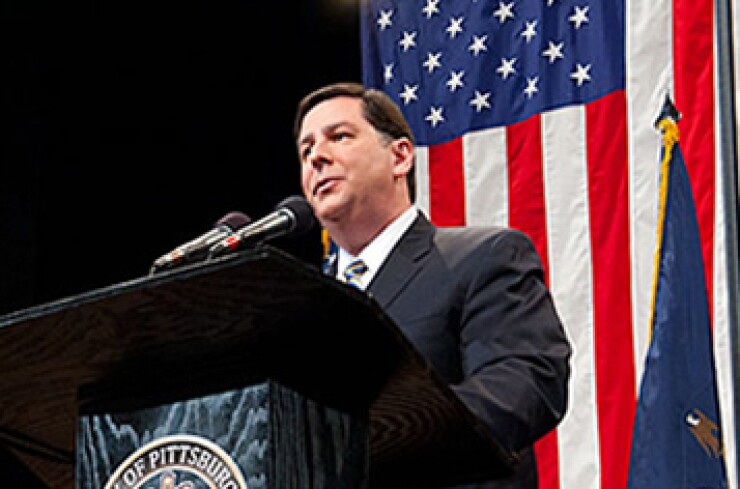
Bill Peduto likes to keep it simple.
"My committee is a committee of one ... me," Pittsburgh's new mayor replied when asked how he would work out a long-term arrangement with the city's many nonprofit organizations.
"I don't do blue ribbon," he said in an interview. "Blue-ribbon panels sit around and recommend things, then someone issues a report and five years later nothing gets done."
Peduto, 49, who took office last month, inherits a city on the upswing from its junk-bond status of 10 years ago. The latest momentum spike came Friday, when Standard & Poor's raised the city's general obligation bond rating to A-plus from A — the city's 11th upgrade in a decade-long climb from junk status.
Pittsburgh has also morphed from the image of a steel city so grimy it got dark at 3 p.m. and lights were on at all hours.
"Ten or 15 years ago, few would have guessed that Pittsburgh would become a leader in biotech or high technology. Well, today it is a leader in both," Gov. Tom Corbett said in Tuesday's budget message in Harrisburg, where he introduced Peduto to the state legislature.
Pittsburgh has roughly $545 million of debt outstanding.
"We believe Pittsburgh will likely maintain its ongoing efforts to maintain structural balance and strong available fund balance," said S&P analyst Linda Yip. Fitch Ratings two weeks ago affirmed its A rating. Moody's Investors Service rates the city A1. All three assign stable outlooks.
Peduto, though,
"They fit together like pieces in a puzzle," he said.
Pittsburgh Fire Fighters Local No. 1 wants the city to exit Act 47, which Peduto predecessor Luke Ravenstahl had favored.
"Respectfully, the only reason that Mayor Peduto wishes to keep the city under the stain of "distressed status" is to wrongfully deny the city's first responders [firefighters and police] a meaningful right to engage in the collective bargaining process that is guaranteed by Act 11 and the Pennsylvania Constitution." Union president Joseph King
Scott Kunka, who remained as the city's finance director in the mayoral transition, described Pittsburgh's finances as stabilizing. "We have to try to address these legacy issues to free up resources for quality-of-life items," said Kunka.
Peduto said he can draw on his 19 years in city government — seven as a City Council chief of staff and 12 as a councilman — during which he developed a rapport with nonprofits, especially Pittsburgh's Big Four — the University of Pittsburgh, Carnegie Mellon University, Blue Cross-Blue Shield insurer Highmark Inc., and the University of Pittsburgh Medical Center. The latter is Pennsylvania's largest private employer.
"Their development is central to the economy. I've worked with a lot of master plans. I have a very, very positive relationship with [University of Pittsburgh] chancellor Mark Nordenberg; an excellent working relationship with [UPMC president] Jeffrey Romoff, the new management at Highmark and [Carnegie Mellon president] Dr. [Subra] Suresh.
"I have a history of working with hospitals and universities. It goes back a long way."
So does Peduto's history with Act 47. As a councilman in 2003, he was the first to propose Pittsburgh join the program, which the state's Department of Community and Economic Development administers.
"I couldn't get a second on my motion," he recalled.
Eighteen months later, the council voted 5-to-4 to request admission to Act 47, which now includes 27 cities.
S&P's Yip cited Pittsburgh's improving reserves, saying officials reported that available fund balances rose to $84.4 million, or 18.4% of expenditures, in fiscal 2012 from $42.6 million, or 8.6%, in fiscal 2010. The city, meanwhile, balanced the fiscal 2014 budget without using any fund balance. Pittsburgh has also posted operating surpluses in two of the past three years.
The current five-year plan indicates balanced operations through fiscal 2018, before pay-as-you-go capital contributions, and the continued maintenance of what S&P calls "good reserves."
Yip said that while continued participation in the Act 47 program limits Pittsburgh's rating, S&P could raise the rating if the city exits Act 47 while maintaining structurally balanced operations and strong reserves.
Peduto, meanwhile, wants to distance Pittsburgh even further from its dark days of steel-industry decline and further into the tech era. Corbett on Tuesday referenced plans by search-engine company Google Inc. to expand in the East End, supplementing its building in an old Nabisco plant.
"I like what Tom Menino did in Boston to bring that city into the 21st century. Michael Bloomberg in New York, too. We want Pittsburgh to be the same type of model," said Peduto, who lives in the Point Breeze neighborhood and still plays adult hockey.
At a time when New York Mayor Bill de Blasio is pushing universal pre-kindergarten programs, Peduto touted Pittsburgh's private-sector involvement in pre-K through PNC Financial Services Group.
"What we have is one of the strongest fundamentals for pre-K in the country. PNC has invested heavily," he said.





